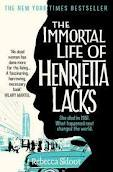 About the Author: Rebecca Skloot is the daughter of poet, novelist and essayist Floyd Skloot. She received a BSc in biological sciences and an MFA in creative nonfiction. She is a former vice president of the National Book Circle Books. She is faculty member at the yearly Mid-Atlantic Summer Creative Nonfiction. Writers Conference and has taught creative writing at the University of Pittsburgh and the University of Memphis. She is also a writing mentor with the Creative Notification mentoring program.
About the Author: Rebecca Skloot is the daughter of poet, novelist and essayist Floyd Skloot. She received a BSc in biological sciences and an MFA in creative nonfiction. She is a former vice president of the National Book Circle Books. She is faculty member at the yearly Mid-Atlantic Summer Creative Nonfiction. Writers Conference and has taught creative writing at the University of Pittsburgh and the University of Memphis. She is also a writing mentor with the Creative Notification mentoring program.About the Book: Henrietta Lacks was born Loretta Pleasant in August 1920 and died October 4, 1951 aged 31. She was born to a family of tobacco farmers in Ronaoke Virginia. Her family is uncertain how her name changed from Loretta to Henrietta. Eliza, her mother, died giving birth to her tenth child in 1924. Henrietta's father felt unable to handle the children, so he took them all to Clover, Virginia and distributed the children between relatives. Henrietta married her fits cousin David Lacks who had already been living with Henrietta's grandfather when she came to live there at the age of 4. They already had two children when they married in 1941 and surprised many in the family as they had been raised like brother and sister. They eventually had five children together after having moved to Maryland. Within four months of having her fifth child in Johns Hopkins Hospital in November 1950, Henrietta was diagnosed with cancer. Elsie was described by the family as "different", "deaf and dumb" and in 1955 died in the Hospital for the Negro Insane where she had been placed in 1950, around the same time Henrietta discovered that she had lumps and unusual bleeding.
She described the sensation as having a knot inside her and was eventually diagnosed at Johns Hopkins Hospital with cervical cancer. This was the only hospital in the area that treated black women. She underwent a course of treatment which involved having radium tubes sewn into her with a follow up of radium treatment at the X Ray department at a later date. During this treatment they removed without her permission, a sample of cancerous and also a sample of non cancerous tissue. Henrietta eventually died of uremic poisoning after almost a year after her initial diagnosis. She was remarkably uncomplaining whilst she underwent extensive often uncomfortable and painful treatment.
She described the sensation as having a knot inside her and was eventually diagnosed at Johns Hopkins Hospital with cervical cancer. This was the only hospital in the area that treated black women. She underwent a course of treatment which involved having radium tubes sewn into her with a follow up of radium treatment at the X Ray department at a later date. During this treatment they removed without her permission, a sample of cancerous and also a sample of non cancerous tissue. Henrietta eventually died of uremic poisoning after almost a year after her initial diagnosis. She was remarkably uncomplaining whilst she underwent extensive often uncomfortable and painful treatment.
The significance of the cells that were removed were that they behaved in a unique way and continued to multiply after her death. The have continued to grow to this day and have become known as HeLa cells . They have supplied the world with tissue cells for the research and study of oncology and have been made a hugely important contribution to medical research.
The Review: Many of the group were shocked as to how her contribution to medical science has carried on without her or her families consent or knowledge. This was revealed to the family during the research into this book. Many were shocked at the exploitation of her and her family. One member of the family likened it to the family being raped. Karen said that the first 150 pages were important for science and the family history. Rolf did feel that it was a work of fiction and it had re-created stories that had grown up around it. The story of Henrietta Lacks has directly lead to the development of medical ethics and transparency in the taking of tissue samples and also contributed to the ethics within the organ transplant process.
Henrietta's family did not know about the tissue sample and the fact that it had been sold throughout the world. Ironically the family could not even afford medical insurances and had not known or benefited from the contribution that Henrietta had made. Some of the group felt that the family dynamic as told was really annoying and the region appeared to be full of people accepting their lot in life. Reference was made to the film Precious which some members of the group felt had demonstrated what happens in the slums regarding the disregard for the rights and the exploitation of individuals.
Why are these cells so productive? They are believed to contain a specific enzyme but why and how is not known.
Overall the book was considered a very important and interesting read although some felt it was overly long.
The books on offer from Rolf were:
Persian Fire - Tom Holland
The Rule of Law - Tom Bingham
Alexander the Great - Paul Cartledge
The Greatest Show on Earth - Richard Dawkins
The Drunkard's Walk - or how randomness rules our lives - Leonard Mlodinow
Uncle Petros and Goldbachs Conjecture - Apostolos Doxiadis
The groups chose The Drunkards Walk
No comments:
Post a Comment